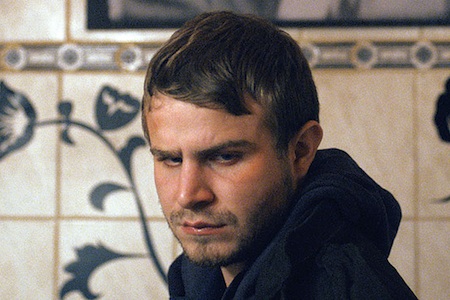Situated at the end of the calendar year, American Film Institute’s AFI Fest encourages assessment, with viewers taking the “temperature” (as director Kim Ki Duk put it in a Q&A) of contemporary independent and international cinema. A cursory viewing of the listings shows one trend heating up: the dissolution of national cinemas as “containers” for film styles. In a conversation with Associate Director of Programming Lane Kneedler, he commented on relatively recent recategorizations. “We used to have very strong national categories in our programming, and that was very helpful for our marketing—things like New Asian Cinema and Latin American Masters.” But, he continued, “the geographical boundaries and borders become ever more porous and ever more invisible.”
True to form, the World Cinema category was thick with foreign Oscar contenders favoring no particular region. Represented: Italy (Caesar Must Die), Romania (Beyond the Hills), Germany (Barbara), Denmark (A Royal Affair) and at least five others. Hong San-Soo (who had not one but two films in the festival last year) and Abbas Kiarostami both served features that simultaneously support and invalidate concepts of national cinema: Kiarostami offering a view of its total destruction in creating a film that, while certainly characteristic of his style, makes a glowing case to melt into its new cultural ID as a Japanese film in Like Someone in Love, while the idiosyncratic film slang of Hong’s In Another Country renders a national cinema of his own, if at times the dynamism of lead actress Isabelle Huppert threatens to consume the piece entirely.
The word “mastery” flitted about in the air (and in programmer introductions) quite a bit more than usual, and shockingly wasn’t, for the most part, entirely hyperbolic. Far from the experimental, the bulk of this year’s programming leaned away from experimentalism and charm and more toward complexity and formal perfection on the whole. In some circumstances, as expected, certain colloquial “masterworks” underperformed—as in the cases of Gomorra director Matteo Garrone’s Reality and Michael Heneke‘s Amour, which both drew large crowds but ultimately appeared to leave attendees lukewarm. The only true disappointment of this ilk was Carlos Reygadas’ much-derided Post Tenebras Lux, which while far from terrible and surprisingly captivating despite a skein of frustrating indulgences (both narrative and technical), wasn’t quite the Emperor’s New Clothes but engendered enough audience dissatisfaction that a heated war of words broke out after a patron guffawed loudly during one of the film’s more absurdist twinges.
Elsewhere in the category, Kim Ki-Duk’s typically brutal but atypically emotional Pieta—his 18th film, a title noted—showed welcome signs of heart beneath operatic crescendos of suffering. I missed the first of Ulrich Seidl‘s planned Paradies trilogy, the sex tourism centered Paradies: Love, but was impressed by the second installment, Paradies: Faith, to bring humor and understanding to its very intentionally controversial strictures without degenerating to mocking its stunted protagonist. Rubber director Quentin Dupieux’s Wrong and Berberian Sound Studio, the giallo-referencing second effort of director Peter Strickland (whose Nurse with Wound-soundtracked first film, Katalin Varga, I enjoyed a great deal) were both charming and well constructed but didn’t exceed their personal hype cycles in a way that would send them shooting into multiplexes in the immediate future.
There were also a number of films in example where pretenses to mastery did not fall short. One such is Portugal’s Academy entry, one time Wim Wenders assistant director Joao Canijo’s hyper-vérité telenovela Blood of My Blood, whose two-years-gestating family loyalty plot sprawled naturally across all portions of the frame—often simultaneously in two locations at once and never without constant motion. Habitual collaborators Véréna Paravel (Foreign Parts, 2010) and Lucien Castaing-Taylor (Sweetgrass, 2010), both of Harvard’s documentary think tank The Censory Ethnography Lab, delivered Leviathan, an experimental doc both breathtakingly innovative and bafflingly accomplished in its fly-on-the-wall/fish-in-the-sea/barnacle-on-the-deck viewpoint-shifting anthropological study of a commercial fishing boat in operation.
Outside of the expansive World Cinema grouping, I indulged a mild sociophobia, avoiding the entirety of the festival’s most hyped sector: Gala Screenings of soon-to-be released highbrow Hollywood fare including Life of Pi, Hitchcock and Walter Salles’ long-anticipated On the Road, but was unable to resist the thrall of some of the festival’s “highly anticipated” (read “very hyped”) Special Screening selections.
Despite a nearly two-hour delay due to “technical difficulties” and the disappearance of Mr. Carax, who unfortunately left the screening before Q&A in frustration over some color issues with the projection, the stimulatingly dreamlike Holy Motors played to a packed house. I’ll refrain from joining the critical pile-on, but I will say that I was immediately pleased at the film’s opening and retained that good feeling until the end. Part of my enjoyment came from the fact that I had entirely glossed over the fact that it stars Dennis Lavant, whose spastic, plastic dancing at the end of Claire Denis’ Beau Travail made quite an impression in the past. Although Motors clearly shares similarities in surface and scope with Mathew Barney’s Cremaster films, a case could be made for it as a kaleidoscopically fractured, explicitly French redux of the Batman franchise if one were in a certain mood.
Another treat in the Special Screenings was the already beloved Shining doc Room 237, which stretched, winking, from humorous to unsettling and back again in front of the packed house. After one of the fest’s most fruitful, playful Q&A sessions, the audience was subjected to an unannounced treat, a screening of Kubrick’s film backward and forward, projected simultaneously just as it had been explained in 237‘s second-to-last paranoia-driven scenario.
Despite the obvious enjoyment of the festival’s larger titles films the most vital category of AFI Fest is undoubtedly New Auteurs, the festival’s heavily curated selection of new works by emerging directors. Many of this year’s selections were notable for their high degree of brutality: Cannes celebré Michel Franko’s second film, After Lucia, brought a surprisingly European sensibility to a chilling story of isolation, bullying and ultimately revenge. Antiviral‘s premise of paparazzi consumption gone awry is a welcome return to more political, satirical science fiction that has been missing of late. Brandon Cronenberg’s film plays on notions of body horror pioneered by his father but is, at least in part, a tricky riff on F.W. Murnau‘s Nosferatu, as indicated by both the demeanor (in sickness) of its young star Caleb Landry Jones and its vampiric subtexts of bloodletting and consumption. Serbian entry Clip scandalized with brutal and explicit scenes of sex and violence, but ultimately washes out as of more of anthropological interest than filmic. The category standout, and perhaps festival standout, was Simon Killer, a near-perfectly cast noir coming-of-age tale which shows early signs of mastery of the form by director Antonio Campos. Killer premiered at Sundance but got lost in the crowd at the larger fest. The advantage conferred by AFI’s smaller field could shoot it out with some serious bona fides.
Perhaps to my own detriment I managed to avoid viewing any films from the “Young Americans” section. Though some of the names remained the same—films by Joe Swanberg’s (Hannah Takes the Stairs), Bob Byington, David Zellner and frequent mumbler (as in mumblecore) Amy Seimetz all appear—the game has largely been changed over the past few seasons. Here Mr. Kneedler projected a new trend led not by entitlement but by preservation: “People are so concerned with the economy and the soft prospects for their future that you see a lot of stories about survival. Stories of people who are honing connections in interpersonal relationships or people who are trying to make a living in some sort of unusual way. A lot of American Film isn’t about climbing to the top of the mountain and being the Top Gun anymore, it’s about surviving and raising a family or fighting for love.”
One holdover from recent years in American film seems to be the reduction in scope: each of the films selected served audiences a distinct sliver of time in (usually) one single life, save the Ross brothers’ colorful and wide-eyed New Orleans doc Tchoupitoulas, which received a modest amount of fervent praise from attendees. Kneedler singled out newcomer Joel Potrykus’ Ape, which had its US premiere at AFI after receiving good notices at Locarno, both as one of his favorites and a selection that he hopes will leave the fest with a good head of steam.
I was likewise absent for the festival’s small but solid Breakthrough category, made up entirely of films programmed via the regular open submission process. Despite, or perhaps thanks to, their relatively small scale, this area was a source of much premiere excitement, showcasing the North American prems of Fien Troch’s dark comedy Kid, David Tosh Gitonga’s Kenyan odyssey Nairobi Half Life and Jan-Ole Gerster’s slacker portrait Oh Boy. Despite this, it was a non-premiere, Drew Dennys droll, honest The Most Fun I’ve Had with my Pants On that emerged from the category with the most supporters around the festival.
The Fest’s smallest category, the newly-conceived and modestly titled “Midnight,” loudly states the case for presenting genre cinema to festival audiences in a program already filled with pulpy think pieces built on skewed genre conventions. I missed the two Mexican selections of the four films, Lord of the Flies-esque remake Come Out and Play and possession shocker Here Comes the Devil, and had already seen Don Coscarelli’s unduly hilarious and surprisingly innovative John Dies at the End, but enjoyed a giddy late screening of the Alamo Draft House-produced omnibus The ABCs of Death. The high level of gore was surely responsible for a small number of walkouts, but most of the crowd stayed in their seats, riveted by the films and the formula (one word-themed short for each letter, the word to be revealed only after the short) until Yoshihiro Nishimura’s “Z is for Zetsumetsu” delivered the final gross-out. gag.






